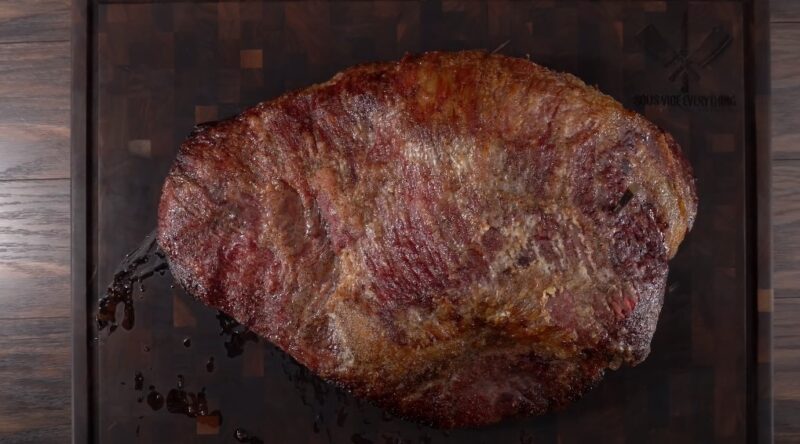Picture this: a bustling kitchen, aromas wafting through the air, and a chef carefully monitoring a smoking brisket. I’ve been that chef, attentively watching over briskets for years, ensuring they reach that perfect state of tender, juicy goodness.
But, as many chefs and home cooks alike have discovered, this slice can sometimes cook faster than expected, leading to a whirlwind of questions and concerns.
In this blog post, we’ll talk about cooking times, addressing the common concern of a brisket cooking too fast. Is it okay? What should you do? With my experience, I’ll guide you through these questions, offering insights and solutions that both novices and seasoned cooks can appreciate.
Cooking Dynamics Explained
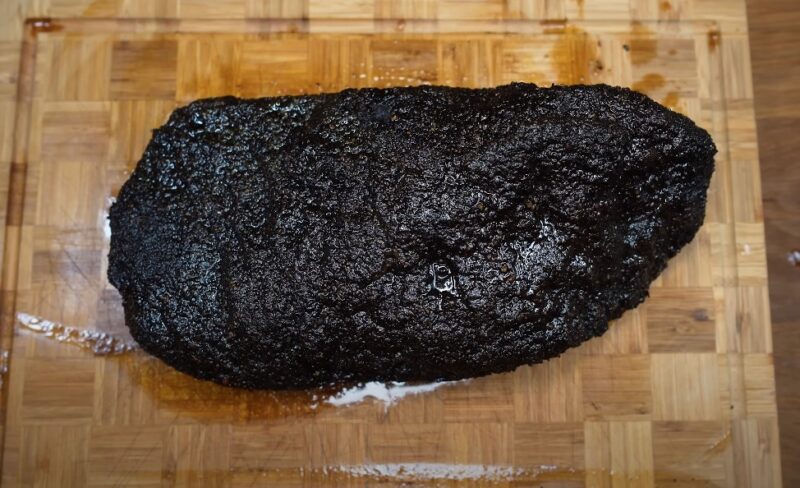
Brisket, a cut from the lower chest of beef, is renowned for its tough, fibrous texture. This cut requires a lengthy cooking process to break down the connective tissues, resulting in that sought-after tenderness. It’s a balancing act; cooking too fast can mean a less-than-ideal texture, while too slow can dry it out.
Factors Influencing Cooking Time
Several factors can alter your brisket’s cooking time. The size and thickness of the cut, the type of smoker or oven used, how long you use the smoker, and even the ambient temperature all play roles. It’s crucial to understand these variables to manage your cooking process effectively.
The Science Behind Slow Cooking
Slow cooking allows the tough collagen in the brisket to transform into gelatin, a process that occurs optimally between 160°F and 205°F. Rushing this process can lead to a tough, chewy brisket, as the collagen doesn’t have enough time to break down properly.
When Brisket Cooks Too Fast
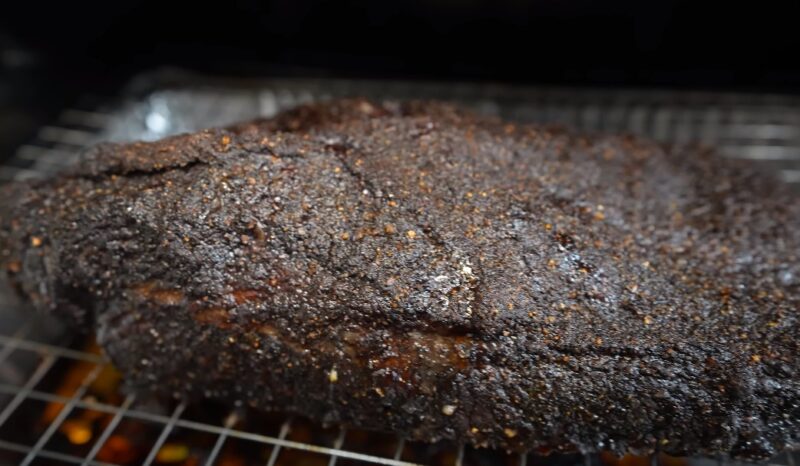
A brisket cooking too fast will reach its target internal temperature quicker than expected. However, temperature isn’t the only indicator. A cut of meat that hasn’t cooked long enough may lack the characteristic ‘jiggle’ and won’t probe tender.
Potential Causes
A brisket might cook faster due to higher cooking temperatures, thinner cuts, or even a malfunctioning thermometer. It’s important to scrutinize these factors to understand why your meat is speeding through its cooking process.
Is It OK?
The short answer is: it depends. If the meat is tender and flavorful, a faster cooking time might not be a concern. However, in most cases, a brisket cooking too quickly can mean a compromise in texture and taste.
What To Do If It Is Cooking Too Fast
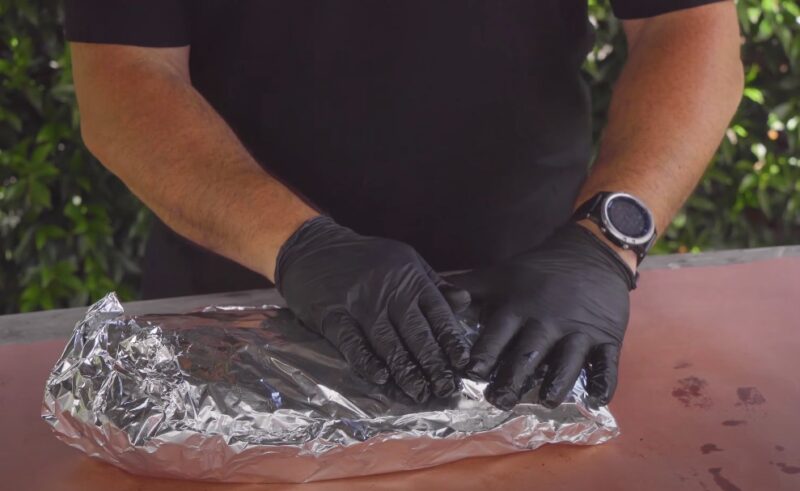
If you notice your brisket cooking faster than anticipated, the first step is to reduce the heat. Lowering the temperature can slow the cooking process, allowing more time for the collagen to break down.
Wrapping
Wrapping the brisket in butcher paper or foil – known as the Texas Crutch – can help control the cooking speed. This method also helps retain moisture, ensuring the meat doesn’t dry out.
Resting is Crucial
Once cooked, resting the brisket is non-negotiable. This allows the juices to be redistributed, ensuring a moist and tender final product. A brisket that has cooked too fast should rest longer to compensate for the expedited cooking process.
Preventing a Speedy Brisket in the Future
Constant monitoring and a reliable thermometer are key. Maintaining a consistently low temperature is crucial for a perfect cut of meat.
Know Your Equipment
Each smoker or oven has its quirks. Knowing your cooking equipment’s behavior can help you better manage the brisket cooking process.
The Importance of Size and Cut
Selecting the right size and cut of brisket can also play a role. A thicker, more uniform cut will generally cook more predictably than a thinner, irregular one.
Advanced Techniques for Brisket Mastery
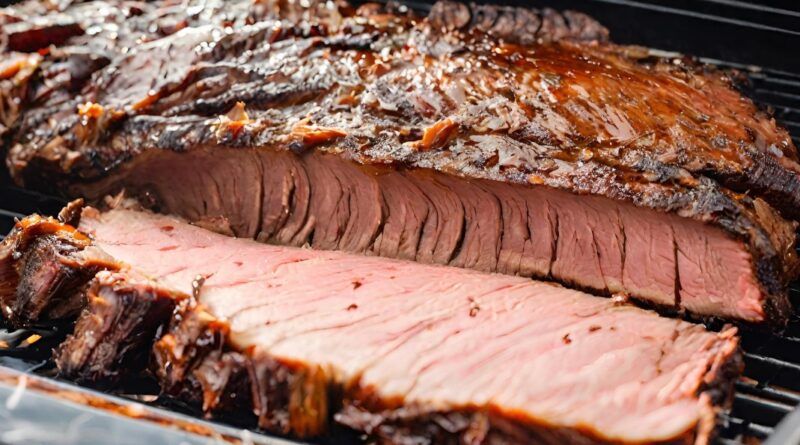
Experimentation is key in mastering brisket cooking. Traditional slow smoking is a popular method, but some chefs also explore oven braising or using a pressure cooker for different textures and flavors. Grasping these various methods broadens your culinary toolbox, providing options for different scenarios, including when a brisket is cooking too fast.
The Role of Marinades and Rubs
Marinades and rubs not only add flavor but can also impact cooking times. Some ingredients in marinades, like acidic components, can tenderize the meat, potentially altering the cooking dynamics.
Similarly, sugar-based rubs can cause the exterior to cook faster due to caramelization. It’s essential to consider these factors when preparing your brisket.
Adjusting Recipes for High Altitude Cooking
High altitude cooking can significantly affect brisket cooking times. The lower air pressure at high altitudes means lower boiling points, which can change how meat cooks.
If you’re cooking in a high-altitude area, adjustments to cooking time and temperature may be necessary.
The Importance of Quality Ingredients
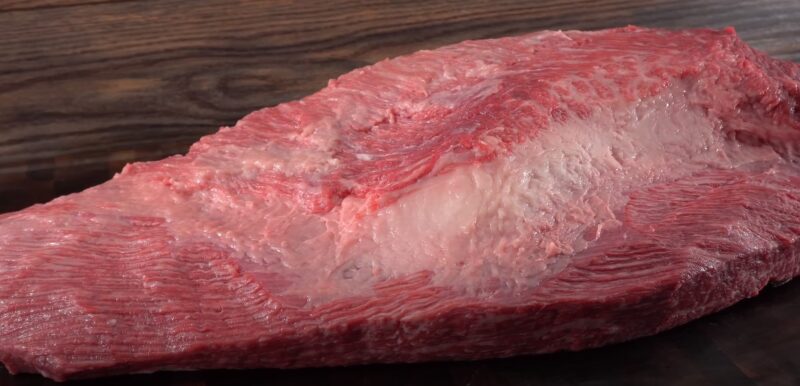
Not all briskets are created equal. The quality of the meat plays a crucial role in the cooking process and the final outcome. Look for well-marbled briskets, which tend to be more forgiving and result in a juicier, more flavorful dish.
The Impact of Meat Grade
The USDA grades meat based on factors like marbling and age. Higher grades like Prime or Choice often yield better results in terms of texture and flavor. While these grades may be pricier, the investment can be worth it for a superior brisket experience.
Considering Grass-Fed vs. Grain-Fed Beef
The debate between grass-fed and grain-fed beef also extends to brisket. Grass-fed beef tends to be leaner, which can affect cooking times and moisture retention. On the other hand, grain-fed beef usually has more marbling, which can be beneficial for slow-cooked brisket.
Pairing and Serving Suggestions
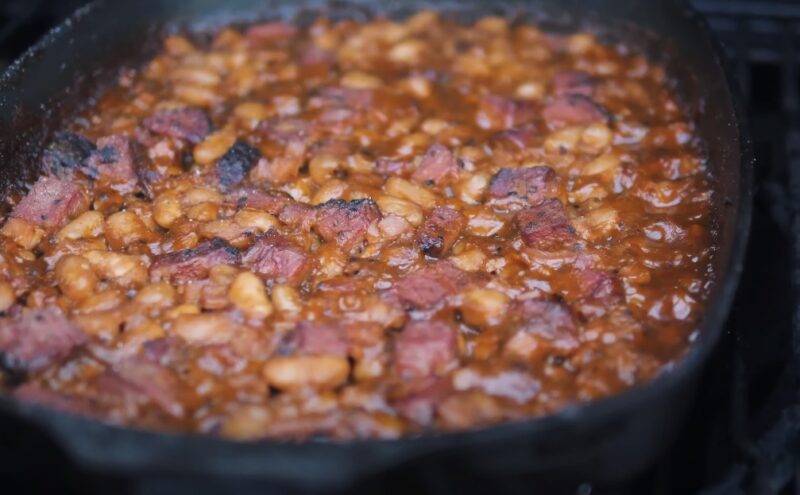
A brisket meal isn’t complete without the right sides. Classic pairings like coleslaw, baked beans, and cornbread not only complement the flavors but also make the meal more satisfying. Experiment with sides to find the perfect match for your brisket.
Wine and Beverage Pairings
The right beverage can elevate a brisket meal. Full-bodied red wines like Cabernet Sauvignon or Zinfandel pair well with the rich flavors of brisket. For non-alcoholic options, consider iced tea or lemonade, which offer a refreshing contrast to the meat’s richness.
Creative Leftover Ideas
Leftover brisket can be a treasure trove for creative cooking. Use it in sandwiches, tacos, or even as a pizza topping. The smoky flavor of brisket can add a new dimension to many dishes, turning leftovers into exciting new meals.
FAQs
Can I slow down a brisket cooking too fast without a smoker?
Yes, if you’re using an oven, lower the temperature and tent it with aluminum foil to slow down the cooking process.
How do I know if my brisket is done if it’s cooking too fast?
Apart from reaching the internal target temperature of around 195°F to 205°F, a properly cooked cut should feel tender when probed and have a nice bark on the outside.
Will spritzing my brisket help if it’s cooking too fast?
Yes, spritzing with apple cider vinegar or water can help regulate the surface temperature and prevent it from cooking too quickly.
What if my brisket reaches the desired temperature too soon?
If it reaches the desired temperature prematurely, wrap it in foil and place it in a cooler to rest. This will allow the internal temperature to stabilize and the juices to redistribute.
Can I use a slow cooker if my brisket is cooking too fast on the grill?
Yes, transferring to a slow cooker on a low setting can help finish the cooking process more gently and evenly.
Does slicing the brisket differently help if it cooks too fast?
Slicing it against the grain can help make the meat feel more tender, especially if it cooked faster than intended and may have ended up a bit tougher.
Concluding Thoughts
The bottom line is that patience is indeed a virtue. While a brisket cooking too fast can be a cause for concern, it’s not the end of the world. With the right knowledge and techniques, you can navigate this challenge and still achieve a delicious result.
Remember, cooking is as much an art as it is a science. Each cut of meat is unique, and adapting to its needs is part of the joy of cooking. It doesn’t matter if you’re a seasoned chef or a weekend warrior in the kitchen; knowing and embracing these nuances will elevate your cooking game to new heights.
